#berlin atonal
Explore tagged Tumblr posts
Text






Berlin Atonal festival Sergey Skip
#art#installation#berlin atonal#festival#berlin#music#electronics#electronic#techno#lighting#glow#film photography#photography#design#art direction#stage#setup#u
979 notes
·
View notes
Text

Powell and Wolfgang Tillmans
5 notes
·
View notes
Text


Kraftwerk, Berlin
Atonal Festival 2024, « Transcriptions », with Family N’diaye Rose, LABOUR, Lamin Fofana, Nkisi & Shackleton.
#festival#atonal#Berlin#kraftwerk#photography#scenography#industrial#music#experimental#lights#laser#visual arts#contemporary music#art#lamin fofana#LABOUR#Nkisi#shackleton#N’diaye rose
2 notes
·
View notes
Text
youtube
there’s a stretch around the 19-22min mark where they leave earth..
0 notes
Text

The 100 Best Books of the 21st Century.
As voted on by 503 novelists, nonfiction writers, poets, critics and other book lovers — with a little help from the staff of The New York Times Book Review.
NYT Article.
*************
Q: How many of the 100 have you read? Q: Which ones did you love/hate? Q: What's missing?
Here's the full list.
100. Tree of Smoke, Denis Johnson 99. How to Be Both, Ali Smith 98. Bel Canto, Ann Patchett 97. Men We Reaped, Jesmyn Ward 96. Wayward Lives, Beautiful Experiments, Saidiya Hartman 95. Bring Up the Bodies, Hilary Mantel 94. On Beauty, Zadie Smith 93. Station Eleven, Emily St. John Mandel 92. The Days of Abandonment, Elena Ferrante 91. The Human Stain, Philip Roth 90. The Sympathizer, Viet Thanh Nguyen 89. The Return, Hisham Matar 88. The Collected Stories of Lydia Davis 87. Detransition, Baby, Torrey Peters 86. Frederick Douglass, David W. Blight 85. Pastoralia, George Saunders 84. The Emperor of All Maladies, Siddhartha Mukherjee 83. When We Cease to Understand the World, Benjamin Labutat 82. Hurricane Season, Fernanda Melchor 81. Pulphead, John Jeremiah Sullivan 80. The Story of the Lost Child, Elena Ferrante 79. A Manual for Cleaning Women, Lucia Berlin 78. Septology, Jon Fosse 77. An American Marriage, Tayari Jones 76. Tomorrow, and Tomorrow, and Tomorrow, Gabrielle Zevin 75. Exit West, Mohsin Hamid 74. Olive Kitteridge, Elizabeth Strout 73. The Passage of Power, Robert Caro 72. Secondhand Time, Svetlana Alexievich 71. The Copenhagen Trilogy, Tove Ditlevsen 70. All Aunt Hagar's Children, Edward P. Jones 69. The New Jim Crow, Michelle Alexander 68. The Friend, Sigrid Nunez 67. Far From the Tree, Andrew Solomon 66. We the Animals, Justin Torres 65. The Plot Against America, Philip Roth 64. The Great Believers, Rebecca Makkai 63. Veronica, Mary Gaitskill 62. 10:04, Ben Lerner 61. Demon Copperhead, Barbara Kingsolver 60. Heavy, Kiese Laymon 59. Middlesex, Jeffrey Eugenides 58. Stay True, Hua Hsu 57. Nickel and Dimed, Barbara Ehrenreich 56. The Flamethrowers, Rachel Kushner 55. The Looming Tower, Lawrence Wright 54. Tenth of December, George Saunders 53. Runaway, Alice Munro 52. Train Dreams, Denis Johnson 51. Life After Life, Kate Atkinson 50. Trust, Hernan Diaz 49. The Vegetarian, Han Kang 48. Persepolis, Marjane Satrapi 47. A Mercy, Toni Morrison 46. The Goldfinch, Donna Tartt 45. The Argonauts, Maggie Nelson 44. The Fifth Season, N.K. Jemisin 43. Postwar, Tony Judt 42. A Brief History of Seven Killings, Marlon James 41. Small Things Like These, Claire Keegan 40. H Is for Hawk, Helen Macdonald 39. A Visit from the Goon Squad, Jennifer Egan 38. The Savage Detectives, Roberto Balano 37. The Years, Annie Ernaux 36. Between the World and Me, Ta-Nehisi Coates 35. Fun Home, Alison Bechdel 34. Citizen, Claudia Rankine 33. Salvage the Bones, Jesmyn Ward 32. The Lines of Beauty, Alan Hollinghurst 31. White Teeth, Zadie Smith 30. Sing, Unburied, Sing, Jesmyn Ward 29. The Last Samurai, Helen DeWitt 28. Cloud Atlas, David Mitchell 27. Americanah, Chimamanda Ngozi Adichie 26. Atonement, Ian McEwan 25. Random Family, Adrian Nicole LeBlanc 24. The Overstory, Richard Powers 23. Hateship, Friendship, Courtship, Loveship, Marriage, Alice Munro 22. Behind the Beautiful Forevers, Katherine Boo 21. Evicted, Matthew Desmond 20. Erasure, Percival Everett 19. Say Nothing, Patrick Radden Keefe 18. Lincoln in the Bardo, George Saunders 17. The Sellout, Paul Beatty 16. The Amazing Adventures of Kavalier & Clay, Michael Chabon 15. Pachinko, Min Jin Lee 14. Outline, Rachel Cusk 13. The Road, Cormac McCarthy 12. The Year of Magical Thinking, Joan Didion 11. The Brief Wondrous Life of Oscar Wao, Junot Diaz 10. Gilead, Marilynne Robinson 9. Never Let Me Go, Kazuo Ishiguro 8. Austerlitz, W.G. Sebald 7. The Underground Railroad, Colson Whitehead 6. 2666, Roberto Bolano 5. The Corrections, Jonathan Franzen 4. The Known World, Edward P. Jones 3. Wolf Hall, Hilary Mantel 2. The Warmth of Other Suns, Isabel Wilkerson 1. My Brilliant Friend, Elena Ferrante
859 notes
·
View notes
Text
I'm curious - how do you think the world would react if Germany built a monument for hitler? how would you react?
well ... history shows that no one would bat an eye because there actually are monuments built for genocide orchestrators in turkey, and yet, no one seems to find it… disturbing, to say the least. take this one, for example: this is the tomb of talat pasha, the sinister architect behind the Armenian Genocide of 1915.

it's on the hill of "eternal liberty," grotesquely standing opposite the florence nightingale hospital in istanbul. his vile letters, containing official orders for the Armenian massacres, are out in the open – available for anyone to read.
on March 15, 1921, talat pasha met his deserved fate when he was assassinated by the courageous Armenian avenger, Soghomon Tehlirian. (more about it here.)
in a sickening display, turkey’s former allies, the germans, organized talat’s grandiose funeral in Berlin, complete with numerous wreaths, turks arriving from various countries and venomous anti-Armenian speeches. moreover, it was hitler himself who sent talat's body back to istanbul on a steam train adorned with swastikas in 1943.
and yet, to quote one of the greats, the rest is silence…
the world has been as blind and as deaf as it chooses to be when it comes to the Armenians. but imagine the condemnation, the outrage, the backlash, the protests that would erupt if Germany did the same for hitler. why is that? is our blood not red enough? were our tears not salty enough? were our cries not loud enough? I guess not.
this hypocrisy is not just an oversight; it is a cruel reminder that justice is selective, and for the Armenians, justice remains an elusive dream. the world’s indifference to turkey’s continued glorification of their murderous, genocidal ancestors and their refusal to face their heinous past, while continuing to serve the same agenda, should be thrown back at anyone who dares to tell Armenians, "it's all in the past. turn the page. turkey has changed. turks have changed."
nothing has changed. for every Armenian, it will forever be April 24, 1915, until turkey acknowledges and atones for their vile and heinous crimes.
#break the chain of ignorance#history#armenian genocide#armenia#armenian history#genocide#turkish crimes#turkish drama#operation nemesis#soghomon tehlirian#literature
166 notes
·
View notes
Text
Though calling out antisemitism is central to the commissioners’ role, it’s unclear what qualifies these officials to adjudicate anti-Jewish bigotry. Klein, for instance, came to his current position after a stint working as the German government’s representative to Jewish organizations, but prior to that, he spent most of his career in Germany’s foreign service working on unrelated issues, stationed in places like Cameroon and Italy. When I visited him in his office in Berlin last April, only a menorah decal pasted on one of the windows hinted at the nature of his position. Klein told me that there are no standardized training programs for the commissioners or educational requirements that they must fulfill before their appointments. Schüler-Springorum pointed out that, though references to the Holocaust underlie every aspect of Germany’s antisemitism system, many of the commissioners are far from experts on the history in question. “It’s amazing how little they know about National Socialism,” she lamented. None of the antisemitism commissioners for either the German Federal Government or its Bundesländer, or states, is ethnically Jewish—which, according to Klein, is by design. “The fight against antisemitism is a problem for the whole of society. It isn’t a problem for the Jewish community to face by itself,” he told me. “I mean, it’s not as though the most pressing problem with antisemitism in Germany is among Jews.”
Indeed, when Jews interact directly with the system, it is often as its targets: Klein told the Berliner Zeitung in a January 2021 interview that “tendentially left-leaning Israelis in Berlin” should “be sensitive to Germany’s special historical responsibility” when they criticize Israel. In the eyes of the commissioners, this seems to be all the more true of Muslims and Arabs—especially Palestinians—who voice support for the Palestinian cause. “Palestinians are like a thorn in the side of Germany’s memory culture,” Palestinian German lawyer Nadija Samour told Jewish Currents. They’re “disposable,” but also “crucial for the German identity . . . If you really want to prove how civilized you are, and how philosemitic or pro-Israel you are, you get the chance to prove that by throwing Palestinians under the bus.”
This commitment to Israel advocacy—which requires disciplining the state’s Jewish critics as well as suppressing Palestinian speech—has led observers to argue that the system of antisemitism commissioners exists less to ensure the safety of Jews than to placate Germans’ feelings of guilt for the Holocaust. Indeed, last summer, in the course of admonishing Palestinian Authority President Mahmoud Abbas for comparing Israel’s crimes to the Holocaust during his visit to Germany, Klein emphasized the way that antisemitism hurts Germans. “By relativizing the Holocaust, President Abbas lacked any sensitivity towards us German hosts,” Klein said. Emily Dische-Becker, a left-wing Jewish curator and journalist in Berlin, told Jewish Currents that German antisemitism efforts are ultimately not driven by a concern for Jews. “It basically is an issue of German identity politics at the end of the day,” she said. Neiman—whose 2019 book Learning from the Germans argues that the nation provides a model for other countries struggling with the weight of collective memory—told me that the creation of the commissioner system, and the passage of the anti-BDS resolution the following year, had caused her to question her previous evaluation. “Things have changed really dramatically since the book came out,” she said. “I still think that Germany did something historically unique by putting its crimes in the center of its national narrative, but I also think it’s gone haywire in the last three years. This system of antisemitism commissioners basically went in all the wrong directions.”
127 notes
·
View notes
Note
hallooo💗💗💗do u have any nacho headcannons,like his family,his relationship with his ex,with anatolli etc ?only if u want ofc💓💓,also the last art of him it's extremely beautiful,all my german friends agree 💕💕💕💕( srry for bad english i don't think google translate translates so good)
have a good day/night💓💓🙏,at us in germany now it's 8:45 PM in Berlin kissesss🎀
thank you and i hope you have a great day/evening too
so here's a short list of some of my hc for the mikaelys boys (i'll just throw in my headcanons for anatolii while i'm at it)

Nacho
A friendly and mild-mannered man that gets along with people but is sometimes known to be a bit of a nervous wreck at times.
He dotes quite a lot on Anatolii (when he first started of as a single father, he didn't really have the time to bond with Anatolii because he had to work a lot more now that he had a son to care for and he didn't really know how to balance his time for work and for Anatolii. When he's gotten the hang of managing his time a year or two later, he wasted no time to start providing Anatolii with all the affection and love he needed)
When he was younger, he was quite a troublemaker and had bad company for "friends". But ever since he stepped up as a dad, he has long since cut them off and manned up.
He isn't really up for dating or getting into a relationship with people; not ever since the trainwreck of a relationship he had with Frances. He does feel really guilty about the whole thing, so he decided to dedicate himself to put Anatolii's wants and needs before his as a form of atonement.
When he and Frances were dating when they were younger, he didn't really take their relationship seriously. Now that he looks back, he probably thinks it's just his imagination, but, could he possibly now still have lingering feelings for her..?
He has a large scar on his lower back from the "incident" with Frances.
Currently, Frances and him are on neutral terms. He gets super nervous and awkward when he sees her but when Anatolii does interact with Frances, he can't help but ask his son what was Frances like or how's she doing etc.

Anatolii
He may act and look quite cold, uncaring and unfriendly, but he's really a sweet boy (he doesn't smile a lot but he's good-natured)
Performs really well at school so he's quite smart
He plays football and collects matchbox cars as a hobby.
Also really likes model trains.
Though he may not look like it, he really looks up to his dad more than anyone. He tries to learn how to do things by himself quicker to not be a burden to his dad and also to sometimes earn his dad's praise.
He lived his life not knowing who his mother is, but he's been quite hesitant to pry his dad into talking about it because Nacho would always look quite pained when he does try to talk about it. Nacho has always told Anatolii that, his mother always have and will continue to love him, it's just that there's a certain problem that's keeping her away from them. Out of love for his dad, he just took his word for it.
125 notes
·
View notes
Text

17th Century Samurai Sword Discovered in Berlin
Archaeologists from the Berlin State Office for Monument Preservation have uncovered a 17th century samurai sword during excavations in Berlin, Germany.
The sword has been identified as a Wakizashi, a 17th century short sword worn by the samurai in feudal Japan.
Wakizashi were generally used as a backup or auxiliary sword for close quarters fighting, and when worn together with a Katana, the pair of swords were called daishō, which translates literally as “big-little”.
Wakizashi were also used to commit seppuku, an act of ritualistic suicide by disembowelment, performed to prevent being captured, as a form of capital punishment for serious offences, or to atone for personal disgrace.
The sword was uncovered during excavations of 20th-century cellars in the Molkenmarkt area, specifically on Stralauer Strasse. This narrow street, once lined with houses and commercial buildings, was heavily damaged by bombing during World War II.
Archaeologists found several cellars filled with war related rubble that was discarded during the final stages of the Battle of Berlin. This includes bridles, stirrups, harnesses, and various artillery militaria, in addition to the heavily corroded Wakizashi.

Upon closer examination by the Museum of Prehistory and Early History, conservators found traces of wood and a wrapping of textiles on the handle still preserved.
The researchers also identified the motif of the Daikokuten on the ferrule, a syncretic Japanese deity of fortune, wealth, the household, agriculture, fertility, sexuality and war. In Japanese mythology, the Daikokuten was also one of the Seven Lucky gods or Seven gods of Fortune.
According to a press statement by the State Museums of Berlin: “Melted decorations of chrysanthemum and waterline motifs were also found on the guard. Based on the motifs and style, the handle could be dated to the Edo period (17th to 19th century AD).”
How the Wakizashi came to be found in a Berlin basement is speculated, however, the researchers suggest it may have been a gift from the Takenouchi Mission in 1862 or the Iwakura Mission between 1871 and 1873.
By Mark Milligan.

#17th Century Samurai Sword Discovered in Berlin#samurai#wakizashi#17th century short sword#antique#ancient artifacts#archeology#archeolgst#history#history news#japanese history
39 notes
·
View notes
Text



Berlin Atonal festival Sergey Skip
#art#photography#installation#stage#lighting#glow#film photography#projection#lasers#lights#screen#eyes#berlin#atonal festival#sergey skip#u
4K notes
·
View notes
Note
Do you have any general media recommendations? Like music, TV shows, movies, or books!
I don't want this to get like my other crazy essays where I start and then I can't stop so I'm going to just uhh toss things out. Lemme know if any of these are your favorites too!
Books: Jeanette Winterson's books, all of them, but my especial favorites: Oranges are not the only fruit, The Passion, Sexing the Cherry, The Powerbook, Written on the Body. Her memoir is also excellent. Saturday by Ian McEwan, but do not read Comfort of Strangers. Possession by AS Byatt. The Signature of All Things by Elizabeth Bishop is about a physically unattractive woman who makes a meaningful life, which is SO RARE in fiction. Sholokhov's The Quiet Don. If you want to know what it's like being a Korean woman of a certain generation, I would recommend Kim Ji-young, Born 1982, which I think was translated into English to some acclaim. Katherine Harrison wrote a terrifying and beautiful and grotesque memoir about an incestuous affair with her estranged father that began when she was an adult, The Kiss, which haunts me. For light reading, Murderbot the series is fantastic. Doppelganger by Naomi Klein is a fun to read and very clear layout of exactly how the world works right now. I recommend everything ever written by Alison Bechdel - Dykes to Watch out For, Are you my mother?, The Secret to Superhuman Strength. (I love books by the way, and I'm a compulsive reader so I will just artificially stop here, but like seriously, I can go on forever.)
Movies: I had such a thing for Gerard Depardieu as a weird little girl (he was my first movie star crush, believe it or not), so I say Le Retour de Martin Guerre is SO worth a watch. The Last Temptation of Christ with Willem Dafoe (another obsession) had me genuinely worried I was going to go to hell as I watched and it's fantastic. My Best Fiend a documentary by Werner Herzog about Klaus Kinski (another obsession) (I like weird looking white dudes, what can I say) taught me a lot about filmmaking. Lost in La Mancha, a documentary about Terry Gilliam failing to make a Don Quixote movie was also terrific. Fitzcarraldo and Aguirre Wrath of God (director Herzog, starring Kinski) can't be watched more than once but they'll stay in your mind forever. Himmel Uber Berlin by Wim Wenders. It's just beautiful. Do not watch the horrible Hollywood murder of that film. Pina also by Wim Wenders, which will show you awesome modern dancing. Penelope, where Christina Ricci is a girl born with a pig's snout and James McAvoy is in it. Oh, Atonement has the James McAvoy scene of all time, where he runs after the bus his girlfriend is leaving on. It's Ian McEwan's book as the base so you will be very wounded at the end. The Piano Teacher starring Isabelle Huppert is ... is sure something? It's perverse and gross and lovely, and very important, I think, in stories about women. Suzanne Farrell: Elusive Muse is the documentary that got me obsessed with ballet, and Balanchine, and basically changed my whole cultural life. Dunno if it's available anywhere though - I own a DVD of it. OH, Truth or Dare, which is a Madonna concert documentary is fabulous.
Uh. Do you want Bollywood recommendations? Because I can do that too.
TV Shows: I tend to not watch any tv, and then I get hooked on one tv show and watch it like, a bazillion times. RIVERDALE. Watch Riverdale. Be a RIverdale understander. Also this is my Riverdale Sideblog: @riverdale-retread. I also loved SCANDAL by Shonda Rhimes, starring Kerry Washington, because I received the same education from more or less the same schools as Olivia Pope and I found that so funny at first.
That's all for now but I'll answer any questions or do more specific recommendations if you're curious about anything I put here!
#my recommended#disorganized but heartfelt#incomplete but i think this sort of shows what i like in general lol
7 notes
·
View notes
Text
Roi's captivating journey in Berlín: on defying authority, seeking approval and exploring his desire…
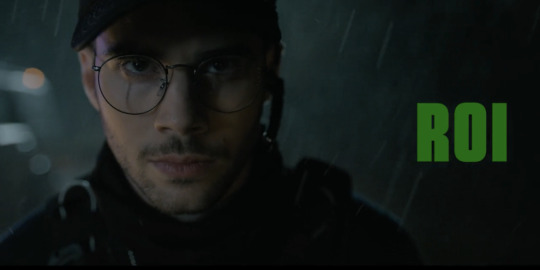
Or a long meta nobody asked for in which I delve into why he’s the best character in this spinoff and why his "romance" with Cameron unfortunately didn’t really make sense.
Foreword : I'm a sucker for nerdy male fictional characters with a hidden hint of confidence, a dark/tragic backstory, who wear the slutty glasses™ and look like they never felt the touch of a woman—of course when Roi was firstly introduced, I knew from the start that he's going to live in my mind rent free for the upcoming months.
˚ · • . ° . ׂׂૢ་༘࿐˚ · • . ° .
From the very first episode, it becomes clear that Berlín unravels as a tale centered around love. Nevertheless, it extends beyond romantic love, notwithstanding the musings of our chaotic, narcissistic dandy of a professional thief who philosophizes about the tantalizingly addictive energy of courtship, chase, and a lust he fervently desires. Although romantic love is prominently depicted as the main thread in the series, it is the comprehensive concept of Love that undergoes demystification, discussion, challenge, embrace, repulsion, and yearning.
The prevailing narrative of the entire season seemed to orbit a distinctive framework: romantic/carnal love, familial love, and self-love, stretching from birth to zenith and eventual demise. What particularly resonated with me was how the creators delved into the exploration of how these love forms can serve as both sources of freedom and imprisonment for the characters. It adds a poetic and meta layer when considering that this entire discussion unfolds against the backdrop of the Parisian landscape.
Within the fragrance that permeated this spinoff, Roi's storyline unquestionably stood out as the most intriguing among the banda. Despite its imperfections, particularly in the romantic aspect (which we'll talk about later), his evolution throughout the season seemed the most logical. To arrive at this conclusion, I believe it's essential to revisit storytelling basics and comprehend why, in my perspective, his arc made the most sense.
For a hero's journey to unfold successfully, it typically follows eight steps, and Roi's arc approximately adheres to these stages, employing a significant amount of telling and a bit of showing:
1. The Call: Running away from home at 13 and engaging in petty crimes. 2. The Threshold: Encountering Berlin at 17 and finally getting out of juvie. 3. + 4. The Challenges and The Abyss: Following the Boss's orders—retrieving the calice, "babysitting" Cameron, and maintaining a distance from her. 5. The Transformation: Failing to comply with orders and defying lover!Berlin. 6. The Revelation: Disclosing the truth to Berlin about the lost necklace during the night at the race, leading to approval and apology. 7. The Atonement: Evading the police, and Roi expressing gratitude for Berlin's guidance and lessons in self-control. 8. The Return (with a Gift): Successfully reaching Madrid, leaving the narrative with a seemingly happy ending, though the final details remain unknown.
Having observed a portion of his journey, Roi's character possesses a distinctive charm, largely stemming from the preconceived notions we harbor about him—"the youngster," "the naive and charming boy who simply follows instructions." I am inclined to think that the most notable feature of his arc this season is its "coming-of-age" essence that resonates with many. He strives to liberate himself from the constraints of unquestioning obedience to Berlin, opting instead to be guided by instinct, explore desire, embrace his identity, and assert his free will.
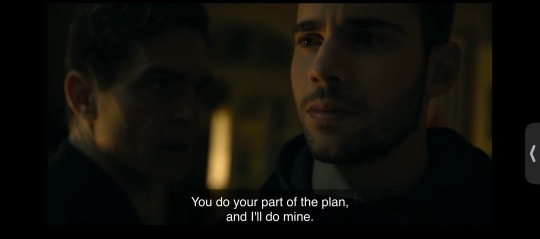
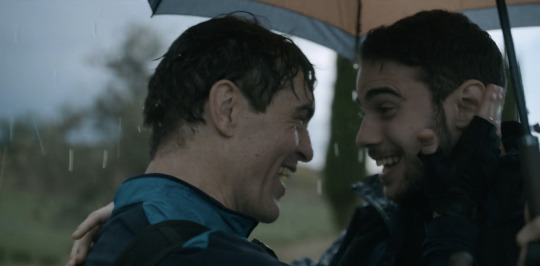
I truly enjoyed the universal elements in his relationship with Berlin: the admiration, care, the vulnerability and pride. I couldn't get enough of their scenes and wished for more. I was particularly intrigued to know a bit more about Berlin's perspective on education and how he imparted his principles to Roi. Surprisingly, it's refreshing to witness how the young man, contrary to expectations, isn't a Berlin Jr., but rather a wiser, more innocent, and stern version of himself.
Roi's evolution from a runaway orphan misfit to a disciplined young man was truly captivating, primarily because it allowed us to connect with him emotionally. He became the only character who shared such a precious and intimate piece of himself, giving us insight into why Berlin holds such significance for him. This added layer of vulnerability only serves to enhance his endearing personality.
On that note, I admire the way his naivety, which parallels Rio in La Casa de Papel, contrasts with his playfulness and extroversion. Roi's serious demeanor is understandable, considering his challenging upbringing both at home and in juvenile detention; he had to be self-reliant and fight his way through life. His skill in unlocking doors provided a glimpse of his delicacy and patience, making him genuinely distinctive. Indeed, the calmness, uncertainty, and darkness were further echoed in his casual attire and color palette—comprising blue, grey, and black.
I could extensively discuss Roi's incredible personality and his son/father relationship he has with Andres, but unfortunately, I just have to talk about the bad. Yes, Roi's story arc has some limitations that left me a bit disappointed, considering the amazing potential within his character. While he ended up demonstrating maturity and professionalism throughout the series, there was a certain immaturity when it came to matters of "love".
I guess that now is a good time to address the elephant in the room: his (quite underwhelming) "romantic" relationship with Cameron. I find myself somewhat blaming the trailer, as it led me to believe I was in for a compelling love story with a unique approach to the "bad girl/good boy trope" (which I adore). I was particularly displeased with how misleading the "lock picking" and the "No me mires" tattoo scenes in the pilot were, as they seemed to be included solely to inject a bit of sexiness into the show.
Listen, I'm a big fan of romance, and one thing that most romance enthusiast tend to do is approaching love stories in two distinct parts: 1) understanding the characters before the relationship, how they function individually, and 2) how the relationship will shape their individual growth and their growth together.
This is often observed through well-known romantic tropes that typically bring characters together and facilitate both physical and emotional connections. So, let's examine which tropes influenced their interactions: work colleagues, forced proximity, tending wounds (and the somewhat cliché "insta love"). This description may seem fitting at first glance, innit? But did these tropes truly work for them?
One crucial factor to consider is time: I strongly believe that a majority of love stories are slow burns that unfold over different spans. And sorry, chief, but timing wasn't on their side.
Apologies to all the Cameroi shippers out there, but I found it difficult to believe in their relationship, and it felt underwhelming for both characters. After finishing Season 1, opting for a platonic relationship might have been the better choice for them. Let me elaborate on why.
If Pina and Martínez Lobato truly intended to highlight romance (which was a bit overwhelming because literally, everyone had a romantic arc—like babe, it’s too much), especially a romance that made sense for the characters, they should have incorporated more angst and a slow burn. Why? Because, in this season, neither of Roi and Cameron are in the right place to fall in love.
On one hand, Roi's (scarce) romantic history reveals his naivety and idealized perception of love. To be frank, I would even go so far as to say his experience is practically nonexistent. His feelings seemed more like infatuation than genuine love, which requires a deeper connection that they didn't really have time to develop.
A part of me thinks Berlin's "strict" teachings about women played a role. The scene in 1.01 in the bathroom somewhat confirmed that Berlin might have admonished Roi in the past, likely instructing him on managing his hormones. Additionally, when our sweet summer child assured Berlin that he didn't initiate or encourage such behavior with Cameron, it became evident that being prudish was a lesson he had clearly absorbed.
Being a reserved young gentleman who wouldn't dare to meet the eyes of a woman he fancies, in contrast to the charismatic lover Berlin, I'm inclined to think he still has his V card—I can't interfere; it's a canon event.
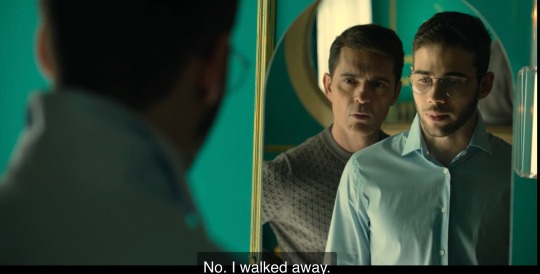
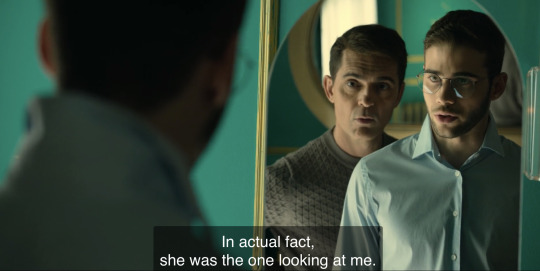
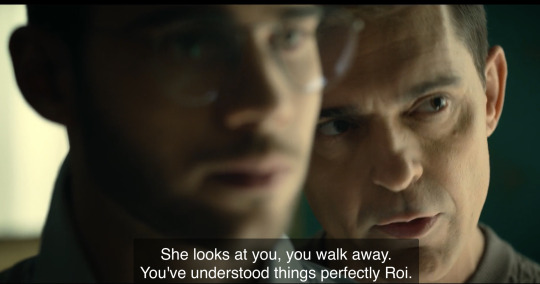
If Roi seriously lacks experience with women, despite his first and only teenage romantic involvement during juvenile detention, it's only natural that he would stumble. This is evident in his interactions with Cameron. His steps are endearing and pure, but also somewhat messy and oddly quick. For someone who hates being seen as an obedient puppy, he swiftly follows Cameron's suggestion about the glasses, removing them instantly. I found this moment quite intriguing. It would have made more sense in 1.04, right after the quarrel at Polignac house. Removing them on that same night would have heightened the scene's impact and symbolically marked the transition from the old to the new Roi. Then again, taking time is crucial. It could have mirrored the fear of crossing boundaries and played with the symbolic idea that desire mirrors fear.
(**internal screaming** The creators missed an opportunity to delve deeper into the use of mirror imagery and internal conflict.)

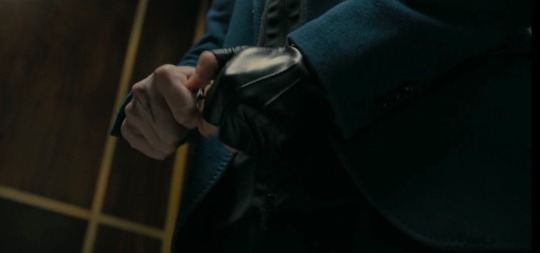
That's why his “love” confession to Cameron in 1.07 appeared laughable, rushed and childish. Indeed, as she aptly said, he has "no idea if they'd still be together if Jimmy wasn't part of the equation." How dare he? I feel like this scene was pivotal, opening the door for Roi to reflect on his advances and avoid rushing into things, making him more cautious about the "lines you cannot cross in love" that dad!Berlin warned him about.
Yes, in the lights of his "romantic" arc, Roi had an illusion of love. Were there emotions involved? Certainly, especially since she helped him discuss his past. Lust? Absolutely.
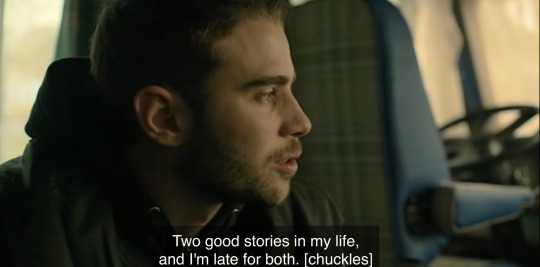
As for Cameron, she's still grappling with trauma from her last relationship (to be honest, given all the suspense, her backstory was quite disappointing). It would have been in line with her character to step back from love and take some time to focus on herself before engaging in anything new. If the creators really wanted to push the romance, they could have only focused on subtle gestures like handholding and meaningful gazes to build the romantic tension, and not just sexual tension.
I didn't appreciate how they were quickly and overly physical with each other. The emphasis on physical touch didn't enhance the pseudo-emotional intimacy. In fact, I don't believe Cameron fell in love or became very infatuated with Roi. I would have preferred her to embody the femme fatale vibe Esther and Alex gave her and maintain a more casual relationship. Yielding to Roi's advances in the end seemed out of character because she should have been triggered, wary of falling deeply in love again and hurting our sweet baby boy Roi.
This is why their kiss felt unnecessarily desperate and passionate. A simple hug would have sufficed. I understand the fear of not seeing each other for three days, but the purpose of Cameron's words in between kisses, like "promise me" and "I can't myself," left me confused and mainly with unanswered questions. It's even more frustrating when we overlook her role in the heist and the unique talent that makes her authentic in the crew.
To wrap up, I believe both of these characters should have been individually explored. Consider the Octopus and the No me mires tattoos, for instance. Why introduce his through Cameron? Why didn't Roi ask about the meaning behind hers? Exploring this could have provided intriguing clues about her past. We could have witnessed a compelling scene of Roi changing, letting the audience notice the tattoos and prompting questions about their significance. Am I surprised that an entire episode is named after his tattoo, yet its origin remains undisclosed? Not at this point. Consequently, I found it difficult to connect with their bonding over the tattoos.
Despite being 23, their story really felt like a teenage love affair. I suppose I'll let fanfiction fill the void left (or do it myself with missing scenes and an eventual ofc, considering Roi is such fanfiction material).
All in all, Roi was undoubtedly the most captivating character. Performed by a wonderful Julio Peña, he skillfully broke the rules and awkwardly embraced his desires, ultimately earning the approval of his second father figure. I'm uncertain about what to expect in a potential Season 2, but one thing I absolutely need more than ever is flashbacks and explanations, especially given it's fucking Berlin's golden age.

What about you? What's your take on Roi? Did you enjoy his character arc and his "romance"? If you made it to the end, thank you ! Thank you very much for taking the time to read all this ramble of mine. I'm genuinely curious to hear your thoughts within the niche fandom here on Tumblr :)
#bleulone analyzes#talking to myself#berlin meta#berlin roi meta#roi meta#berlin netflix meta#berlin netflix#berlin series#julio pena#julio peña fernández#julio peña#la casa de papel#la casa de papel spin off#money heist#money heist spinoff#esther martinez labato#alex pina#pedro alonso#begoña vargas#berlin cameron#cameron roi#lcdp#lcdp berlin#lcdp spoilers#berlin#berlin 2023#berlin roi#andres de fonollosa#berlin spoilers#roi berlin
18 notes
·
View notes
Text
One morning in November 2011, two men walked into a bank in the eastern German city of Eisenach, pistol-whipped the bank teller, and stole around $99,000. After local police traced the men to a camper van on the side of a nearby road, gunshots rang out, and the vehicle went up in flames. Police officers found two men dead inside; one had shot the other and then turned the gun on himself. Later that day, after hearing what had happened in Eisenach, a woman about 100 miles away poured gasoline around her apartment and set it on fire before fleeing the scene.
The two men, Uwe Böhnhardt and Uwe Mundlos, weren’t typical bank robbers: Along with the woman, Beate Zschäpe, they formed a trio of neo-Nazi terrorists intent on ridding Germany of immigrants and anyone else they believed would threaten the country’s white identity. And the police’s investigation uncovered far more than a string of bank robberies. Böhnhardt and Mundlos had stolen the money to fund the underground terrorist group they led, the National Socialist Underground (NSU), which had planned and committed a series of murders across Germany while escaping the notice of authorities.
When the revelations about the NSU first emerged, they shook Germany to its core, but the story remains relatively unknown outside the country. Journalist Jacob Kushner’s new book, Look Away: A True Story of Murders, Bombings, and a Far-Right Campaign to Rid Germany of Immigrants, seeks to change that.
“A nation that liked to think it had atoned for its racist past would be forced to admit that violent prejudice was a thing of the present. That sixty years after [Adolf] Hitler’s Nazis led Jews and other minorities to their deaths during the Holocaust, German police were so blinded by bias that they couldn’t recognize the racist violence unfolding around them,” Kushner writes. “The case would compel Germans to acknowledge that terrorism isn’t always Islamist or foreign. More often, it’s homegrown and white. And that in an age of unparalleled mass migration, the targets of white terrorism are increasingly immigrants.”
Told primarily through the perspectives of the victims’ family members and others who proactively sought to root out right-wing extremist terrorism, Look Away is divided into three parts. First, Kushner describes how Böhnhardt, Mundlos, and Zschäpe radicalized in the eastern German city of Jena in the late 1990s. They didn’t come to their views alone: After the fall of the Berlin Wall, Germany saw a spike in the number of asylum-seekers arriving in the country. Those new arrivals were often met with protests and violence, including a handful of high-profile riots and attacks on refugee housing. Jena had a thriving right-wing extremist scene at the time. It was led by Tino Brandt, a kind of double agent: He served as a government informant who was supposed to report on the activities of neo-Nazis while funding his own groups promoting the same far-right ideology.
The second section of the book chronicles how the three extremists spent 13 years planning and executing the murders of 10 immigrants across Germany, all under the noses of German authorities. The murders were only connected and solved after the bank robbery in 2011. Kushner lays much of the blame for the NSU’s decade-long killing spree at the feet of the authorities, whose investigations were guided by harmful tropes—bolstered by the German media—about immigrants being involved in drugs or organized crime.
The firsthand accounts of victims’ families powerfully illustrate just how much police officers’ assumptions about the victims led them astray. For instance, Gamze Kubasik, whose father, Mehmet Kubasik, was murdered in their family kiosk in the city of Dortmund in 2006, explained that she and her mother were interrogated for hours about Mehmet’s supposed illicit activities. “I couldn’t listen to it anymore,” she said. “We felt like criminals.”
Some aspects of the investigations verge on the ridiculous. For instance, after Böhnhardt and Mundlos shot and killed Ismail Yasar at his kebab stand in Nuremberg in 2005, German police doggedly pursued the theory that Yasar had been dealing drugs from his stand. They spent a year and around $36,000 of taxpayer money selling kebabs and sodas undercover at a snack bar they had opened to help corroborate their theory, waiting for someone to come up and ask about buying drugs—“But nobody did, because Yasar wasn’t a drug dealer,” Kushner writes. Kerem, Yasar’s son, “couldn’t help feeling that if his father had been a native-born German, his murder would have quickly been solved.”
But Kushner also argues that German society writ large has been complacent in acknowledging the scope of anti-immigrant, white nationalist sentiment after World War II. White nationalism “had never gone away,” he writes. “Similar events that precipitated the Holocaust—pogroms, attacks against Jewish-owned businesses, the expulsion of Jews from their homes—were now happening to immigrants.” Especially in eastern Germany, the 1990s saw the proliferation of neo-Nazis and right-wing extremists, to the point that, in reference to skinheads who committed acts of violence across the east, that period is sometimes called the “baseball bat years.”
The book’s third section covers the NSU trial, which culminated in 2018 with Zschäpe’s conviction on 10 counts of murder and charges for several of the trio’s accomplices. The verdict brought only cold comfort to the families of those killed. “The NSU murdered my father … but the investigators have ruined his honor—they murdered him a second time,” Gamze Kubasik said.
Lest anyone believe that Germany has fully learned its lessons from the NSU affair, Kushner connects it with more recent instances of hate and violence against members of Germany’s immigrant community. The NSU scandal has never fully faded from German public discourse, but after the trial ended, it dropped out of headlines—and was most often mentioned in the wake of other incidents of right-wing extremist violence. In February 2020, a right-wing extremist killed nine people of immigrant background in the central German city of Hanau, targeting two shisha bars in his racist rampage. In November 2022, a 54-year-old man was sentenced to nearly six years in prison for sending threats to politicians, journalists, and other public figures, including Seda Basay-Yildiz, a lawyer of Turkish background in Frankfurt who represented the families of several NSU victims; the letters were signed “NSU 2.0.”
Part of the trouble with eradicating white terrorism in Germany is that anti-immigrant sentiment is alive and well in national politics, too. In January, the German investigative news outlet Correctiv published a bombshell report revealing that right-wing extremists had met in secret late last year to discuss their plans for deporting millions of people of immigrant background, including German citizens. Among those who attended the meeting in Potsdam, just outside Berlin, were high-level politicians from the far-right Alternative for Germany (AfD) party, which holds 77 seats in Germany’s parliament and was polling at 22 percent nationwide at the time. (After the Correctiv report and a spate of other unrelated scandals since its release, the party’s support has now dropped to 16 percent, but it performed nearly five percentage points better in the recent European Parliament elections than it did in 2019.)
These extremists’ plans for “remigration” of those with immigrant backgrounds shed light on the battle lines over who gets to belong in Germany and who doesn’t—and who ultimately decides. To many, they were also a reminder that German authorities have underestimated the threat posed by far-right ideology in a country that prides itself on how it has processed its Nazi history. The Correctiv report prompted widespread backlash among the German population, with millions of people taking to the streets to declare “Never Again.”
Still, the AfD is poised to make gains in three eastern German state elections this fall—including Thuringia, where Böhnhardt, Mundlos, and Zschäpe grew up, and Saxony, where they were based. AfD politicians remain the parliamentary voice of those who would prefer to rid the country of immigrants. “These new neo-Nazis feel emboldened by the rhetoric of a political party that believes Germany has become too fixated with remembering the terror of its past,” Kushner writes of the AfD.
Although Look Away is a German story, Kushner draws connections to illustrate that the failure to confront anti-immigrant, right-wing extremist violence is a problem across Western democracies. The examples are myriad: Whether it led to the slaughter of Black parishioners at a church in Charleston, South Carolina; worshippers at two mosques in Christchurch, New Zealand; or Mexican American and other shoppers in a Walmart in El Paso, Texas, the core ideology that fueled the NSU trio—that of white supremacy—transcends national borders.
That makes the NSU story a warning to the United States as it grapples with its own problems with white terrorism. Terrorist attacks by right-wing extremists have been on the rise in recent years: According to the Anti-Defamation League, such attacks, primarily carried out by white supremacists, killed 58 people in the United States between 2017 and 2022. “The United States will not be spared Germany’s crisis, or its carnage, if we continue to look away,” Kushner concludes.
6 notes
·
View notes
Note
I have a potentially strange question, but the search feature on Tumblr leaves a lot to be desired - do you know of any good WWII whump? Specifically that might involve hospital scenes, or takes place in Europe vs the Pacific theater? The WWII movies I know off the top of my head that involve (admittedly brief) scenes in a hospital/dealing with illness rather than injury are Unbroken (Japan) and Hacksaw Ridge (also Japan), The Great Raid (Phillipines), Flags of Our Fathers (Japan again), and Empire of the Sun (Japan and China). If context helps, I'm working on a one shot for Sam Gillespie and Sister Boniface and referencing his time on Sword Beach. (if you haven't seen it, highly recommend - WWII vet DI is besties with a former code-cracking nun who moonlights as the police scientific advisor and the solve crimes and make puns in 1960's Cotswolds).
I can definitely help you here!! I tend to lean more towards watching ETO WWII media myself. And oddly enough a lot of I've watched doesn't have that much whump. Which is weird for a war film/show. But here are some things I'd recommend:
Band of Brothers - follows U.S. Army troops of E "Easy" Company, 506th Regiment of the 101st Airborne Division from their training in England through D-Day and the rest of the war in Europe.
World on Fire - this show follows characters in Warsaw, Manchester, Berlin, and Paris during their lives as the Nazi party begins to take hold of Europe. Season 1 is set from March 1939 to July 1940 and shows events like the Defense of the Polish Post Office in Danzig, the Battle of the River Plate, the Dunkirk evacuation and the Battle of Britain. Season 2 covers October 1940 to May 1941 and shows the North Africa Campaign, The Blitz, Nazi Germany, and Occupied France.
X-Company - follows five recruits as they are trained as agents at a secret Canadian training facility, Camp X near Lake Ontario east of Toronto and then sent out into the field in Europe.
Dunkirk (2017) - This movie is all about the Battle of Dunkirk and the
Atonement (2007) - Allied soldiers from Belgium, the British Commonwealth and Empire, and France are surrounded by the German Army and evacuated during a fierce battle in World War II.
Combat! - a tv series from the 60s that follows a front line American infantry squad as they battled their way across Europe
Saints and Soldiers (2003) - Four American soldiers and one Brit fighting in Europe during World War II struggle to return to Allied territory after being separated from U.S. forces during the historic Malmedy Massacre.
Saving Private Ryan (1998) - Set in 1944 in France during World War II, it follows a group of soldiers, led by Captain John Miller (Tom Hanks), on their mission to locate Private James Ryan whose three brothers have been killed in combat
finally I totally need to watch sister boniface!! that sounds great!
19 notes
·
View notes
Text

!!!!!! This is wild, you guys - I officially have 2k followers?!?!! This cannot go unnoticed, and so I shall make it everyone's problem (affectionately). Here's what you do:
You can EITHER send me a request by
1. Selecting a period drama from this gorgeous list:
1899 (2022)
Atonement (2007)
Babylon Berlin (2017-) (season 1-3)
Boardwalk Empire (2010-2014)
Marie Antoinette (2006)
The Knick (2014-2015)
Pride & Prejudice (1995 or 2005)
The Pursuit of Love (2021)
World on Fire (2019-)
2. Selecting a category ✨
Favorite/specific character*
Best Outfit(s)
Up Close and Personal™
Cinematography
A colour of your choosing
Relationship/dynamic
Make me choose
*this can be combined with other categories as well. Example: <period drama> + <character> + best outfit(s)
OR
Make me a period drama edit of your choosing. Use #violaobanion or @ me pls 🥰
Timeframe: I am quite the busy bee this spring (yet it's never stopped me from adding on another project lol), so I will only be taking request until April 16th. I hope to get your smashing requests done by April 27th, but because I'm usually quite the time optimist, there will most likely be delayes. Sorry about that in advance 😇 (there's no timeframe if you're the one doing making the edit ofc)
It is of course completely optional to participate. No pressure. I love y'all anyway!
24 notes
·
View notes